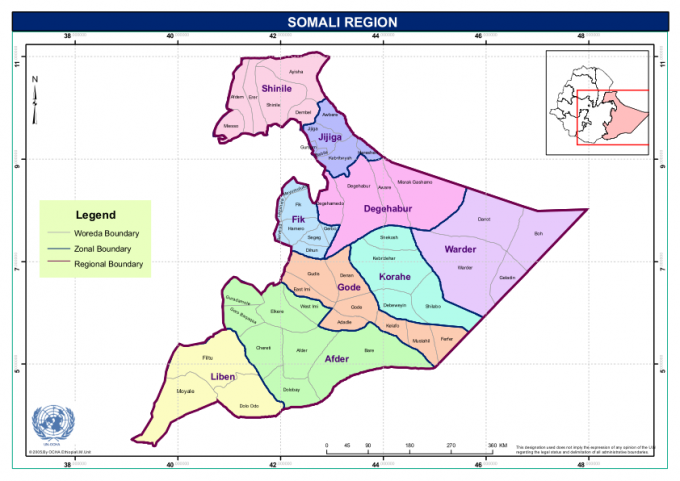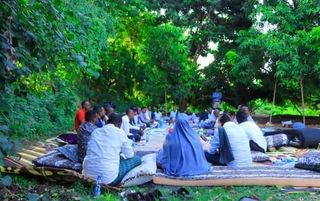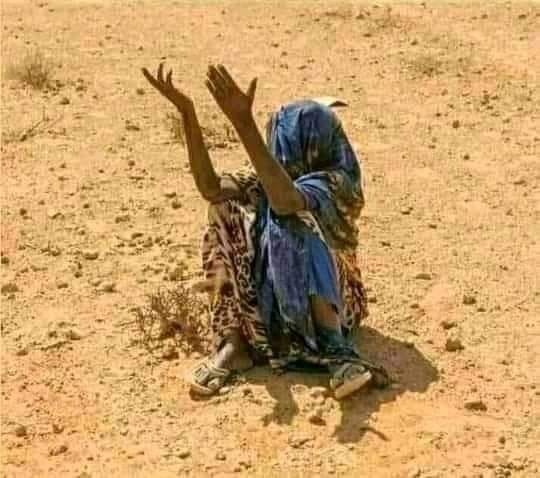By Muktar Ismail Issack
As conditions worsen, regional government funds appear to have been misused.
The Somali region has been crippled by the rampant corruption of successive administrations that continues to harm people, hampering the delivery of basic public services and the ability of the government to help people affected by frequent humanitarian emergencies.

Many in the region perceive that government institutions are captured by elites who are disconnected from the needs of their constituents and a complicit in schemes that benefit the powerful at the expense of ordinary citizens.
The recent revelation that 200 million birr is missing from the regional government’s coffers and that the regional government ran an 1.2 billion birr deficit will further reduce trust in government institutions and worsen existing developmental challenges.
Drought Funds
On 11 November 2021, Somali Regional President Mustafa Muhummed Omar and his senior officials were in Gode town for the first regional cabinet meeting ever held outside of Jigjiga, the region’s capital.
On that same day, the executive regional council visited several project sites, including vegetable farms at the banks of Shabelle River, and met with elders and leaders of the local administration. Later that afternoon, the Somali Regional State executive council sat under a large tree in one of the farms as the seventh session of the Council began.

According to government sources, there were four main agendas: (1) strategic drought response; (2) devising a 100-day plan; (3) allocating additional funds for the regional security office; and; (4) employment issues.
Mustafa said that the primary objective is to save the lives of the people and, secondarily, their livestock. The president stated that 1.8 billion birr was urgently needed to respond to the drought, which has wreaked havoc on the region. He highlighted that out of the required budget, his administration had dedicated only 200 million birr to the Regional Drought Contingency Fund.
The President concluded that there is a need to raise funds in collaboration with the Federal Government, donor agencies, and businesses in the region to try and mitigate the impact of the drought.
Failed reimbursement
However, the Regional Risk Disaster Management head told the Executive Council that his office no longer had the 200 million birr Contingency Fund. According to him, the funds were redirected to the regional Prosperity Party office in the last September election following the regional Prosperity Party executive committee’s decision and then reportedly was loaned to Birtukan Mideksa Office, the National Election Board of Ethiopia (NEBE) Chairperson.
This prompted inquiries about the legalities of transferring government funds in this manner.
After speaking with some regional NEBE officials, there was some understanding that the NEBE Chairperson and the regional government had agreed to reimburse the funds.
According to the agreement, the Prosperity Party was expected to cover all the expenses of the regional election process by using their own money earmarked by the Federal Government, and later reclaim the operating cost encountered during the election process by providing the necessary receipts and other supporting documents to support these transactions. In addition, the regional prosperity party office agreed to provide a written report explaining how every penny was used.
However, we learned that NEBE ultimately rejected requests made by the Somali Prosperity Party office for reimbursement after they failed to produce any receipts or other related supporting documents of the millions of birr that were allegedly used during the election.
In that afternoon meeting, the cabinet approved another 200 million birr and agreed to try and further mobilize the international community in responding to the drought situation.
We tried, without success, to get in touch with Birtukan. Whether Birtukan Medeksa’s understanding of the story is in line with that of President Mustafe Omar is difficult to substantiate. What is obvious, though, is that the funds earmarked for the famine are missing.
Budgetary deficit
At the same meeting, Mustafa informed the Executive Council that the Regional Security Office was short of funds and could not account for 1.2 billion birr. To ensure the security office had sufficient funds, the President suggested reallocating some development funds.
This did not satisfy all the council members, and one demanded that the security office explain the situation. Attendees said that Mustafa tasked Mubashir Dubad, head of the Regional Security Office, to explain the matter to the Council..
Mubashir, in an effort to shield himself from potential perjury, said he did not know anything about said deficit since he is new to the office, and ultimately passed the buck to Hussein Qasim, a cabinet member who was the head of the Regional Security Office until Mubashir took over.
Hussein could not account for the money, but claimed it could have been used for the war efforts in the Afar region, the sources said. Some council members were also not convinced by this explanation.
Eventually, Mustafa asked the members to end the debate over the whereabouts of the 1.2 billion birr since it was getting dark. They then agreed to his plan to reallocate funds from development to security.
It may not be a coincidence that this happened in November 2021, at a time when the Tigray Defense Forces and Oromo Liberation Army were advancing towards Addis Ababa. It may be that the 1.2 billion birr was embezzled when the fall of Abiy Ahmed’s government was seemingly in the cards. In other words, the funds stated above could have been systematically embezzled.
An insider, who prefers his name to be withheld, informed us that regional officials bought real estate in Nairobi, Dubai, and Ankara. The inside source revealed that a close associate of one official was shuttling in between Jigjiga, Dubai, and Switzerland during the same period. This source also informed us that several high ranking regional officials are building a multistory building in a high-end residential area adjacent to the presidential palace.
These two cases may just be the tip of the iceberg. High-level corruption exists deep within the region’s elite. Government institutions, politics, and family matters intersect, as leaders and their families loot the public coffers.
Other common corruption malpractices in the region include falsification of documents, fraud, nepotism, bribery, tax evasion, and not following legal tendering procedures.
Developmental challenges
This corruption manifests itself in the poor delivery of the community’s basic social services in health, water supply, education, security, and infrastructure.

The Somali region remains underdeveloped despite its potential for pastoral and agro-pastoral development. Alongside Afar, the Somali region has the highest levels of multidimensional poverty. According to the last Emergency Preparedness and Response Plan, an estimated 2.4 million people need food and/or cash assistance.
It is affected by climatic and man-made risks, including drought and floods that result in food insecurity, disease, and loss of livelihood assets that exacerbate poverty and community vulnerability.
Moreover, the region faces challenges to meet the needs of the increasing influx of Internally Displaced People (IDPs) as a result of inter-clan conflict and drought-induced displacement.
According to estimates, USD $2.5 billion in resources was allocated to the region in fiscal year 2020-2021. Despite the presence of local administrative structures across the region that are supported by more than fifty national and international aid agencies, development indicators show only modest or no progress.
Lack of political goodwill and weak government institutions have created loopholes in which graft thrives. This has had deleterious consequences on the delivery of essential services.
Despite the existence of anti-corruption laws that exist, a perennially weak administration has been reluctant to promote accountability and has encouraged massive looting at the regional level. This corruption is orchestrated by rent-seeking actors, such as contractors, groups connected to the administration through political patronage, private and state-owned firms, and government officials.
Moreover, the criminal justice system has fallen prey to powerful individuals, rendering the corridors of justice inefficient and ineffective. This has created a system that is largely subservient to political power and which encourages corruption by failing to punish the powerful elite for such economic crimes.
Bleak Picture as Drought Intensifies
As public funds are misused, residents are struggling with one of the worst droughts experienced in recent years. Most zones of the region received below-average rainfall from October to December 2021. The second rainy season extended conditions from moderate to extreme drought, marking the third consecutive poor season in the Somali region.
The availability of pasture and water is significantly below average, resulting in emaciated livestock and large-scale livestock deaths. Over 120,000 livestock, predominantly cattle, have reportedly died in the most drought-affected areas of Dawa, Liban, and Afder zones.
According to a government report from December, herd sizes in Dawa, Liban, and Afder zones are now, on average, around only 50 percent of 2020 levels. Despite inflationary pressure and ever-increasing price of stable food, the prices of livestock continue to plummet as livestock conditions deteriorate owing to malnutrition.
The region has continued to record high severe acute malnutrition (SAM) admissions. A total of 9,401 children were admitted to SAM treatment in October 2021. SAM admissions in October rose by 18% as compared to last year in the same month. A total of 89,839 children were admitted with SAM treatment in January- October 2021, out of whom 3,343 were admitted to inpatient care (5% of total SAM admissions).
The ongoing drought will continue to worsen the severity of acute food insecurity among pastoral and farming populations in the Somali region. These people have already experienced sustained reductions in food and income over the past three-to-four seasons due to the ongoing drought, early 2020 flooding, the desert locust upsurge, and economic impacts of COVID-19.
As a result of this combination of factors, large-scale emergency food, water, and livelihoods assistance is urgently needed across the Somali region to prevent extreme food consumption deficits, widespread malnutrition and hunger-related mortality, and destitution resulting from displacement.
Fighting corruption
Pervasive bribery and embezzlement of public funds by regional officials, primarily the President’s inner circle, is conventionally taken as a sign that the integrity of governing institutions has broken down. The strength and integrity of state institutions lie in the implementation of laws and directives that tackle corruption. Misconduct of officials erodes public trust and hinders socio-economic growth and development, preventing already scarce resources from going to where they are most needed.
When corruption is so endemic and flourishes at the highest levels of political leadership, it is impossible to control it at the lower level. Fighting corruption by reforming institutions requires empowering the public with information to report on and prosecute the corrupt leadership.
Regrettably, it appears that a timely drought response, investments in human capital, progress in human development, and improvements in basic service delivery will remain a distant dream for residents of the Somali region.
Muktar Ismail Issack
Email: [email protected]
————
Muktar is a disaster prevention specialist, former Somali region’s presidential advisor on development, and a former UN representative
We welcome the submission of all articles for possible publication on WardheerNews.com. WardheerNews will only consider articles sent exclusively. Please email your article today . Opinions expressed in this article are those of the author and do not necessarily reflect the views of WardheerNews.
WardheerNew’s tolerance platform is engaging with diversity of opinion, political ideology and self-expression. Tolerance is a necessary ingredient for creativity and civility.Tolerance fuels tenacity and audacity.
WardheerNews waxay tixgelin gaara siinaysaa maqaaladaha sida gaarka ah loogu soo diro ee aan lagu daabicin goobo kale. Maqaalkani wuxuu ka turjumayaa aragtida Qoraaga loomana fasiran karo tan WardheerNews.
Copyright © 2024 WardheerNews, All rights reserved


